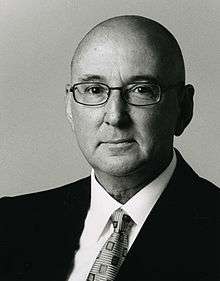Ross Honeywill
Ross Honeywill is an Australian social scientist.[1] His books have been published in the US, China, Australia and New Zealand.[2]

An Adjunct Associate Professor in business and economics,[1] Honeywill is Executive Director of the Centre for Social Economics,[3] based in Melbourne Australia. He has a PhD from the University of Tasmania.[1]
He developed the Desire Economy model and the NEO typology - both population classifications revealing a measure of high-value consumption - for North America, Australia and Asia.[4]
He lives in Melbourne, Australia with conceptual artist and writer, Greer Honeywill.[4]
Career
In 1997 professional services firm KPMG bought his Values Bank Research Centre and renamed it the Centre for Consumer Behaviour and appointed Honeywill director. Prior to KPMG Honeywill was a research director and management consultant.[5] Before that, he worked as a retail manager and in arts administration.
Books
Honeywill is the author of and contributor to business and social science books, as well as author of a number of mainstream books, including NEO Power, Lamarck's Evolution and Wasted. Lamarck's Evolution was launched by Nobel Laureate Professor Peter Doherty and John Long at the 2008 Melbourne Writers Festival.[6] In 2011, Wasted was shortlisted in Australia for the Ned Kelly Award for true crime writing and is under development as a motion picture. The business/management book, One Hundred Thirteen Million Markets of One, is published in North America.
- 2001: I-Cons: the essential guide to winning and keeping high-value customers (with Verity Byth) Random House
- 2004: (Chinese edition) I-Cons: the essential guide to winning and keeping high-value customers (with Verity Byth) Citic Publishing, Mainland China
- 2006: NEO Power: how the new economic order is changing the way we live, work and play (with Verity Byth) Scribe Publications
- 2008: Managing the Innovation Faultline - chapter in Inside the Innovation Matrix (with Verity Byth) Australian Business Foundation
- 2008: "Lamarck's Evolution: two centuries of genius and jealousy. Pier 9 (a Murdoch Books imprint), ISBN 1921208600
- 2010: Wasted: the true story of Jim McNeil, violent criminal and brilliant playwright. Viking (a Penguin imprint)
- 2012: One Hundred Thirteen Million Markets of One: How the New Economic Order can remake the American economy (with Chris Norton) Fingerprint, USA
- 2014: It's Not a Glass Ceiling; It's a Masculine Fault Line - chapter in Gender Discrimination and Inequality, The Spinney Press - editor J Healey
- 2016: The Man Problem: Destructive Masculinity in Western Culture, Palgrave Macmillan (New York)
- 2018: Somewhere Else to Die A novel (recipient of Arts Tasmania grant for 2014) - under construction
Journals and papers
- 2011: 'Water in the Wires' - fiction - Island Magazine edition 126 (Spring 2011)
- 2011: 'A Radical Dimension of Normality: Beauvoir as diviner of masculine madness in ordinary men'. Sapere Aude - Journal of Philosophy, Vol 3, No 6. (Brazil)
- 2012: Rape: modern men making a choice - Centre for Gender Equity
- 2013: 'PM Takes a Stalinist Stance on Science' - Australasian Science, Vol 34, No 10 (December 2013)
- 2013: Gender and Biological Determinism - Centre for Gender Equity
- 2014: Tasmania - towards a new economy ISBN 978-0-646-91654-5 A paper on the contribution of low-carbon values to a new Tasmanian economy
Achievements
- 2016: Advisory Board member - University of Melbourne's Social Equity Institute
- 2015: Expert Panel "Women & Girls" - Department of Premier & Cabinet (Tasmania)
- 2013: Chairman of Judges - Tasmanian Literary Awards
- 2010–13: Chairman, Festival of Voices (Tasmania)
- 1993–97: Board-member, Melbourne International Film Festival
References
- "Ross Honeywill - Profiles - University of Tasmania, Australia". Utas.edu.au. 28 June 2016. Retrieved 8 August 2016.
- "ross honeywill: Books". Amazon.com. Retrieved 8 August 2016.
- "About – Social Economics". Socialeconomics.com.au. Retrieved 8 August 2016.
- "Data scientist and NEO creator Ross Honeywill now confronts The Man Problem". Afr.com. 30 January 2016. Retrieved 8 August 2016.
- "Penguin Books Australia". Penguin.com.au. 20 May 2016. Retrieved 8 August 2016.